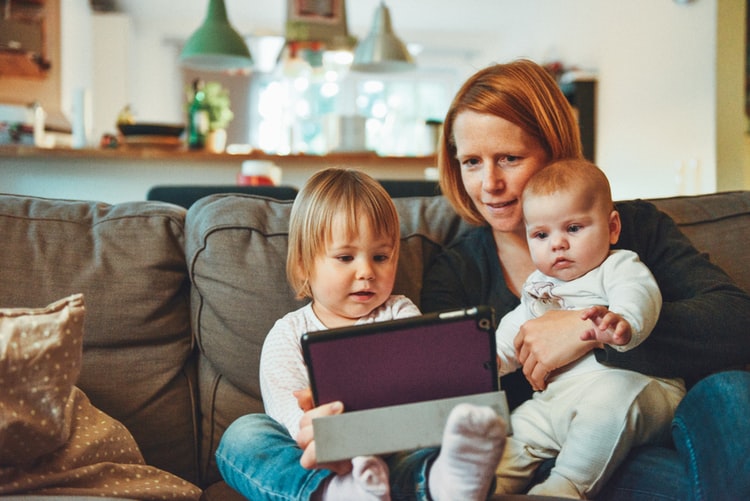10 Mental Health Tips for Busy Moms

In this article
Being a mom is one of the most rewarding jobs in the world, but it is not without its share of challenges. Along with the heart-melting smiles and adorable giggles that come with having little ones around, you get sleep-deprived nights and a to-do list that seems impossible to conquer.
According to the 2019 State of Motherhood Survey, 85% of moms said they don’t feel understood or supported by society.
So, how can you keep your cool when the demands keep piling up?
Here are 10 mental health tips for busy moms that can help you stay calm and relish the joys of motherhood.
Tip #1: Don’t compare yourself to other moms
It’s human nature to look to our peers for social cues, but comparing yourself to other busy moms is not going to do your mental health any favors. This is particularly true in the era of social media, where you can find post after post of other moms looking gorgeous and fit while smiling alongside their perfect-looking babies in a sparkling clean, and pristinely decorated house.
Is it any surprise that a survey of Canadian women found that 69 percent had insecurities that stemmed from social media apps?
It is important to understand that the parts of their lives that people post online are not an accurate depiction of their real life. And these negative comparisons can lead to depression, anxiety, and self-criticism.
When you catch yourself making comparisons, try to remind yourself of your own strengths and accomplishments. And remember that you are the mom that your children need.
Tip #2: Practice self-care
As busy moms trying to juggle all their other responsibilities, self-care often gets put on the back burner. Even if you’re not leaving the house, try to find a few minutes in the morning to put on a little bit of makeup and fix your hair.
Those weekends at the spa might be a thing of the past while your kids are young. But that doesn’t mean you can’t find smaller ways to pamper yourself — whether it’s a 20-minute soak in a warm bathtub with a good book or an at-home manicure or facial.
Do your best to get enough sleep, even if that means sneaking in a nap. Sleep deprivation – a common problem for moms – can contribute to anxiety, depression, and other mental health issues. Make sure you’re focusing on healthy eating, too, as junk food has been linked to depression.
Caring for yourself can enhance your well-being and positively impact your life, offering significant mental health benefits. In this endeavor, a therapist can serve as a valuable companion, aiding you in addressing the unique challenges of both motherhood and self-care.
Tip #3: Get creative
One of the best relaxation techniques for busy moms that is often overlooked is being creative. Try to connect with yourself by doing something creative each day that you love, such as writing, knitting, painting or doing something musical. Even if it’s just for 15 minutes.
Being creative increases happiness and improves mental health. If you’re really struggling to get some creative time alone, fingerpainting with your kids or playing with play dough together might do the trick.
On those days where you’re really pressed for time, why not put on your favorite songs and dance around with your little ones or play an instrument for them. If they’re really small, they might find watching you dance and sing pretty entertaining!
Tip #4: Schedule some “me” time
Don’t forget to schedule a bigger period of some weekly “me” time for yourself. You might have your partner make breakfast with the kids every Sunday morning while you go running solo. Or, perhaps, you’ll make a point of sitting down with your favorite drink and watching something funny on TV every Saturday night after the kids have gone to bed.
Make sure this time is all about you and what you want to do. Try to schedule it when you are unlikely to be interrupted.
Tip #5: Get moving
You might feel like you never stop moving, but it is worth taking some time out of your busy days for some intentional physical exercise. This can be an instant mood-lifter because it releases endorphins in your brain that make you feel good and energize your spirits – what busy mom couldn’t use more of that?
After running around all day taking care of family and work responsibilities, exercise might sound exhausting. Still, once you get started, you will likely find that it actually helps you feel refreshed. And there’s no need to head to the gym.
A jog around the block (even if it’s with your kids on their bicycles) or walking a few laps around the soccer field while your children are at practice can go a long way toward improving your physical and mental health.
Studies have shown that running for just 15 minutes per day is enough to reduce the risk of major depression by an impressive 26%. You might also try fitting in 10 minutes of stretches or yoga in the morning.
Tip #6: Don’t be afraid to say “no”
When you have children, your life changes in many ways, and you simply won’t be able to do everything you did pre-kids.
Don’t be afraid to say “no” to hosting Thanksgiving dinner this year or feeding the neighbor’s cat while they’re on vacation if it’s going to be too stressful.
Most people will understand, and you should never feel guilty about doing what is necessary to stay sane and spend time with your kids.
Tip #7: Work on your relationship
The dynamics between couples change when kids enter the picture, and there is no getting around it. However, you’ll feel more satisfied in your relationship if you make sure kid-related topics don’t dominate your conversations. Make a point of also talking about the topics and interests you discussed before you became parents.
If possible, try to spend some quality time doing things together as a couple. Whether it’s date night in the living room after the kids go to sleep or letting the in-laws babysit while you head to the beach for a few hours.
Tip #8: Ask for help
Saying “no” isn’t the only thing busy moms struggle with – it can also be hard to ask for help. When you’re feeling overwhelmed, ask a trusted family member to watch your kids while you get some exercise or much-needed sleep.
Alternatively, you could arrange a babysitting swap with friends or neighbors. Sometimes, simply calling up a friend or relative to get some advice and perspective is enough to take some of the weight off your shoulders.
Tip #9: Avoid multitasking
Although there’s nothing wrong with folding some laundry while you’re talking on the phone with your parents, serious multitasking is a big contributor to stress and burnout. It divides your attention and makes you less efficient at both tasks, not to mention more likely to make a mistake (7).
Focus on one task at a time, and you might be surprised by how much you can accomplish – and how much better you feel. When you are with your children, let yourself be fully present with them and savor every moment instead of trying to reply to work emails while you’re playing with them.
Devoting all your attention to being in the moment with your children also lets you enjoy some of the benefits that come from practicing mindfulness. So everybody wins!
Tip #10: Get expert guidance
Sometimes, the pressures of life are just too much to handle on your own. Although a healthy lifestyle, self-care, and positive interpersonal relationships can help you manage the stresses of motherhood, some busy moms need extra support.
CDC research indicates that around 1 in 8 women experience postpartum depression symptoms, and many more women will experience episodes of major depression in a given year.
Our professional therapists at Calmerry can give busy moms the coping skills they need every day without feeling overwhelmed. And online therapy is a modern, convenient option that allows you to get the necessary support without leaving home and without worrying about taking care of your child.
It’s one of the best investments you can make in yourself. You will be better equipped to care for your loved ones if you are approaching the job with a clear mind and a happy heart.
online therapy
live video session



